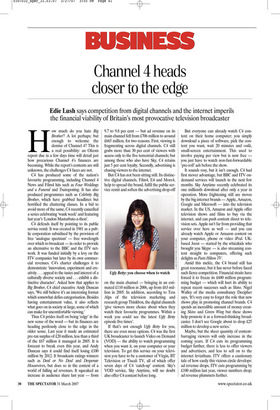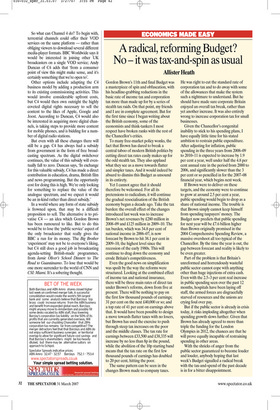Channel 4 heads closer to the edge
Edie Lush says competition from digital channels and the internet imperils
the financial viability of Britain’s most provocative television broadcaster
How much do you hate Big Brother? A lot perhaps; but enough to welcome the demise of Channel 4? This is a real possibility: an Ofcom report due in a few days time will detail just how precarious Channel 4’s finances are becoming. While the report’s contents are still unknown, the challenges C4 faces are not.
C4 has produced some of the nation’s favourite programming, including Channel 4 News and Film4 hits such as Four Weddings and a Funeral and Trainspotting. It has also produced programmes such as Celebrity Big Brother, which have grabbed headlines but horrified the chattering classes. In a bid to avoid more of the same, C4 recently cancelled a series celebrating ‘wank week’ and featuring last year’s ‘London Masturbate-a-thon’.
C4 defends itself by pointing to its public service remit. It was created in 1981 as a public corporation subsidised by the provision of free ‘analogue spectrum’ — free wavelength over which to broadcast — in order to provide an alternative to the BBC and the ITV network. It was funded initially by a levy on the ITV companies but later by its own commercial revenues. C4’s charter challenges it to demonstrate ‘innovation, experiment and creativity ... appeal to the tastes and interest of a culturally diverse society and ... exhibit a distinctive character’. Asked how that applies to Big Brother, C4 chief executive Andy Duncan says, ‘We still believe it’s an interesting format which somewhat defies categorisation. Besides having entertainment value, it also reflects what goes on in society at large, some of which can make for uncomfortable viewing.’ Thus C4 prides itself on being ‘edgy’ in the new sense of the word — but its finances are heading perilously close to the edge in the older sense. Last year it made an estimated pre-tax surplus of £20 million, less than a third of the £67 million it managed in 2005. It is forecast to break even this year, and Andy Duncan says it could find itself losing £100 million by 2012. It broadcasts ratings winners such as Deal or No Deal and Desperate Housewives, but does so in the context of a world of falling ad revenues. It squeaked an increase in audience share last year — from 9.7 to 9.8 per cent — but ad revenue on its main channel fell from £706 million to around £665 million, for two reasons. First, viewing is fragmenting across digital channels. C4 still grabs more than 30 per cent of viewers with access only to the five terrestrial channels; but among those who also have Sky, C4 retains just 5 per cent loyalty. Secondly, advertising is chasing viewers to the internet.
But C4 has not been sitting still. Its distinctive digital channels, Film4, E4 and More4, help to spread the brand, fulfil the public service remit and soften the advertising drop-off on the main channel — bringing in an estimated £110 million in 2006, up from £63 million in 2005. In addition, according to Tess Alps of the television marketing and research group Thinkbox, the digital channels ‘give viewers more choice about when they watch their favourite programmes. Within a week you could see the latest Ugly Betty episode five times’.
If that’s not enough Ugly Betty for you, there are even more options. C4 was the first UK broadcaster to launch Video on Demand (VOD) — the ability to watch programming when you want it, on your computer or your television. To get this service on your television you have to be a customer of Virgin, BT Television or Tiscali TV, all of which offer seven days of C4 ‘catch-up’ content. Sky’s VOD service, Sky Anytime, will no doubt also offer C4 content before long. But everyone can already watch C4 content on their home computer; you simply download a piece of software, pick the content you want, wait 20 minutes and voilà, small-screen entertainment. This used to involve paying per view but is now free you just have to watch non-fast-forwardable ‘pre-roll’ ads before the show.
It sounds rosy, but it isn’t enough. C4 had first mover advantage, but BBC and ITV ondemand services will launch in the next few months. Sky Anytime recently celebrated its one millionth download after only a year in operation. More frightening still are moves by the big internet brands — Apple, Amazon, Google and Microsoft — into the television market. In the US, Amazon and Apple offer television shows and films to buy via the internet, and can push content direct to television sets. Apple isn’t far from providing that service over here as well — and you can already watch Apple or Amazon content on your computer, phone or video iPod. UKbased Joost — started by the whizzkids who brought you Skype — is also streaming content straight to computers, offering such delights as Paris Hilton TV.
Amid this melée, the C4 brand still has great resonance, but it has never before faced such fierce competition. Financial straits have forced it to freeze its £600 million programming budget — which will hurt its ability to repeat recent successes such as Skins. Nigel Walley of the media consultancy Decipher says, ‘It’s very easy to forget the role that new shows play in promoting channel brands. C4 spends an incredible amount of money creating Skins and Green Wing but these shows help promote it as a forward-thinking broadcaster. I don’t see Google about to drop £25 million to develop a new series.’ Maybe, but the sheer quantity of contentbarraging viewers will only increase in the coming years. If C4 cuts its programming budget further, there is less to offer viewers and advertisers, and less to sell on to the internet leviathans. ITV offers a cautionary tale of how easily this vicious circle develops: ad revenue drops, ITV cuts programming by £100 million last year, viewer numbers drop; ad revenue plummets further. So what can Channel 4 do? To begin with, terrestrial channels could offer their VOD services on the same platform — rather than obliging viewers to download several different media-player formats. BBC Worldwide says it would be interested in joining other UK broadcasters on a single VOD service; Andy Duncan of C4 adds that ‘from a consumer point of view this might make sense, and it’s certainly something that we’re open to’.
Other options include adapting the C4 business model by adding a production arm to its existing commissioning activities. This would involve considerable upfront costs, but C4 would then own outright the highly coveted digital rights necessary to sell the content to the likes of Apple, Google and Joost. According to Duncan, C4 would also be interested in acquiring more digital channels, is taking steps to provide more content for mobile phones, and is bidding for a number of digital radio stations.
But even with all these changes there will still be a gap. C4 has always had a subsidy from government in the form of free broadcasting spectrum. As the digital switchover continues, the value of this subsidy will eventually fall to zero. Duncan says, ‘In exchange for this valuable subsidy, C4 has made a direct contribution in education, drama, British film and news programming. But the opportunity cost for doing this is high. We’re only looking for something to replace the value of the analogue spectrum, and we expect it would be an in-kind rather than direct subsidy.’ In a world where any form of state subsidy is frowned upon, that may be a difficult proposition to sell. The alternative is to privatise C4 — an idea which Gordon Brown has been rumoured to like. But to do this would be to lose the ‘public service’ aspect of the only broadcaster that really gives the BBC a run for its money. The Big Brother ‘experiment’ may not be to everyone’s liking, but C4 still does a good job in broadcasting agenda-setting British-made programmes, from Jamie Oliver’s School Dinners to The Road to Guantànamo. To lose that would be one more surrender to the world of CNN and CSI: Miami. It’s a sobering thought.











































































 Previous page
Previous page